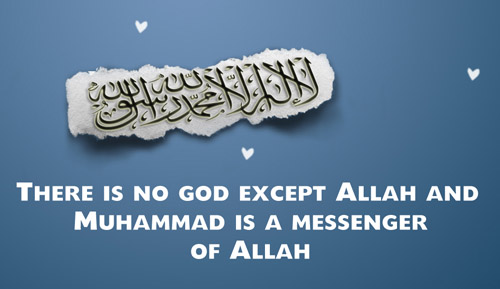
Nothing relieves the heart and makes one happy more than thinking well of others. It protects one from the harm of worrisome thoughts that disturb his peace of mind and exhaust the body. Thinking well of others leads to a sound heart, strengthens the ties of cordiality and love among the individuals of a community, and frees the hearts from hatred and rancor. The Prophet,  , said: “Beware of assumptions, for assumption is the falsest of speech, and do not be inquisitive, and do not spy upon one another, and do not vie with one another, and do not envy one another, and do not hate one another, and do not shun one another; be fellow-brothers and slaves of Allah.”If only the members of the Muslim community would adhere to this sublime behavior, their enemies would never dare to attack them and their famous policy of “divide and rule” will never succeed because the hearts are united and the souls are pure.
, said: “Beware of assumptions, for assumption is the falsest of speech, and do not be inquisitive, and do not spy upon one another, and do not vie with one another, and do not envy one another, and do not hate one another, and do not shun one another; be fellow-brothers and slaves of Allah.”If only the members of the Muslim community would adhere to this sublime behavior, their enemies would never dare to attack them and their famous policy of “divide and rule” will never succeed because the hearts are united and the souls are pure.
Ways to Think Well of Others
There are certainly many ways that a Muslim can think well of others; some of which are:
1- Supplication
Supplicating to Allah The Almighty is the gate to every goodness. The Prophet,  , would ask his Lord to grant him a sound heart.
, would ask his Lord to grant him a sound heart.
2- Putting Oneself in the Place of Others
If each one of us puts himself in the place of his brother when the latter does or says something, this will help him think well of others. Allah The Almighty directs His slaves to this meaning in the verse where He Says (what means): {Why, when you heard it [the falsehood against ‘Ai'shah, may Allah be pleased with her], did not the believing men and believing women think good of one another?}[Quran 24:12] In another verse, Allah The Almighty makes the believers feel as if they are one single entity, to the extent that when one of them meets his brother and greets him, it is as if he is greeting himself. Allah The Almighty Says (what means): {But when you enter houses, give greetings of peace upon yourselves - a greeting from Allah.} [Quran 24:61]
3- Interpreting the Words of Others in the Best Possible Way
This was the habit of the righteous predecessors. ‘Umar  said, “Do not think ill of a word that your believing brother utters as long as it can be interpreted in a good way.”
said, “Do not think ill of a word that your believing brother utters as long as it can be interpreted in a good way.”
Imam Ash-Shafi‘i  was ill once, and some of his brothers came to visit him; one of them said, “May Allah strengthen your weakness [He intended to supplicate to Allah in order to eliminate his weakness].” Ash-Shafi‘i
was ill once, and some of his brothers came to visit him; one of them said, “May Allah strengthen your weakness [He intended to supplicate to Allah in order to eliminate his weakness].” Ash-Shafi‘i  said, “If Allah strengthens my weakness, it would kill me!” The man said, “By Allah, I intended nothing but goodness.” Ash-Shafi‘i
said, “If Allah strengthens my weakness, it would kill me!” The man said, “By Allah, I intended nothing but goodness.” Ash-Shafi‘i  replied, “Even if you insulted me, I know that you sought goodness.” Thinking well of others is true brotherhood, even in things that cannot be interpreted in a good way.
replied, “Even if you insulted me, I know that you sought goodness.” Thinking well of others is true brotherhood, even in things that cannot be interpreted in a good way.
4- Making Excuses for Others
When anyone says or does something that annoys or grieves one, he should try to find excuses for him and recall the status of the righteous who used to think well of their fellows and make excuses for them. They would say, “You should make seventy excuses for your brother.” Ibn Seereen  said, “If you come to know that a brother has harmed you with either a word or a deed, you should make an excuse for him; if you did not find one, you should say, ‘There may be an excuse that I do not know of.’” When you exert your utmost to make excuses for the words and deeds of others, you will save yourself the trouble of assuming and you will avoid blaming your fellows excessively.
said, “If you come to know that a brother has harmed you with either a word or a deed, you should make an excuse for him; if you did not find one, you should say, ‘There may be an excuse that I do not know of.’” When you exert your utmost to make excuses for the words and deeds of others, you will save yourself the trouble of assuming and you will avoid blaming your fellows excessively.
5- Abstaining from Judging the Intentions of Others
This is one of the greatest causes that help one think well of others. One leaves the intentions to the only One who knows them: Allah The Almighty, for He did not command us to check each others' hearts and intentions, and thus we have to avoid harboring ill-thoughts about others.
6- Recalling the Harmful Consequences of Evil Assumptions
The one who thinks ill of others lives in endless trouble and grief, to say nothing of the fact that he loses all those who socialize with him, even the closest people to him. It is natural that people make mistakes, even unintentionally. Accusing others along with thinking well of oneself is one of the evil consequences of thinking ill of others. This is one way a person may be guilty of ascribing purity to oneself that Allah The Exalted forbade in His Book. Allah The Almighty Says (what means): {So do not claim yourselves to be pure; He is most knowing of who fears Him.} [Quran 53:32] In another verse, Allah The Exalted criticizes the Jews when they ascribed purity to themselves. Allah The Almighty Says (what means): {Have you not seen those who claim themselves to be pure? Rather, Allah purifies whom He wills, and injustice is not done to them, [even] as much as a thread [inside a date seed].} [Quran 4:49]
Thinking well of others requires extensive training and striving against one’s self, particularly because the devil is inseparable from man like the blood that runs through his body. He never stops his attempts to sow dissension within the Muslims and stir up disputes among them. Thinking well of others is one of the greatest means to block this way before the devil. We ask Allah The Almighty to Grant us sound hearts and Help us to think well of our brothers and sisters. -islamweb.net

 Karma is a Sanskrit word meaning actions or deeds, and a spiritual concept in several Eastern religions, primarily Hinduism and Buddhism. Generally speaking, it is the principle of retributive justice determining a person's state in this life and in his reincarnations. Kar means the physicality of action and ma means producing or creating. Thus, karma is that which is created or produced by one's physical organs. However, karma as a concept does not mean only physical actions, because mental actions also create karma.
Karma is a Sanskrit word meaning actions or deeds, and a spiritual concept in several Eastern religions, primarily Hinduism and Buddhism. Generally speaking, it is the principle of retributive justice determining a person's state in this life and in his reincarnations. Kar means the physicality of action and ma means producing or creating. Thus, karma is that which is created or produced by one's physical organs. However, karma as a concept does not mean only physical actions, because mental actions also create karma. The Resurrection is a forty-verse chapter revealed in Mecca. Most Meccan chapters deal exclusively with the fundamentals of faith, and this one concentrates particularly on the Day of Resurrection and humankind’s habit of denying its inevitability. The name of the chapter is taken from the first verse, and it also describes the theme and subject matter. It is believed to be one of the earliest chapters revealed, and its style indicates that the concepts and teachings were presented to the people of Mecca in brief yet forceful sentences. This chapter predominantly addresses those who deny the Hereafter and replies to their doubts and objections.
The Resurrection is a forty-verse chapter revealed in Mecca. Most Meccan chapters deal exclusively with the fundamentals of faith, and this one concentrates particularly on the Day of Resurrection and humankind’s habit of denying its inevitability. The name of the chapter is taken from the first verse, and it also describes the theme and subject matter. It is believed to be one of the earliest chapters revealed, and its style indicates that the concepts and teachings were presented to the people of Mecca in brief yet forceful sentences. This chapter predominantly addresses those who deny the Hereafter and replies to their doubts and objections.